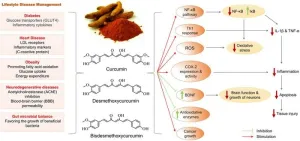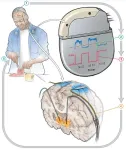(Press-News.org) Rutgers researchers have found a new way to manage the receptors that control the sense of touch, which could lead to treating chronic pain more effectively.
“Identifying a natural molecule that specifically reduces pain sensitivity offers hope for new therapeutic strategies in the management of pain,” said Tibor Rohacs, a professor in the Department of Pharmacology, Physiology and Neuroscience at Rutgers New Jersey Medical School and a member of the Rutgers Brain Health Institute. “Our goal is to translate these findings into effective treatments that improve the quality of life for people suffering from chronic pain.”
The study was written by Matthew Gabrielle, a doctoral student in the laboratory of Tibor Rohacs at Rutgers New Jersey Medical School.
A natural molecule called phosphatidic acid can reduce the activity of certain touch-sensing ion channels in the body, according to a study published in Nature Communications.
Researchers found that increasing the levels of phosphatidic acid in cells makes them less sensitive to touch. This finding was confirmed through experiments on sensory neurons and tests in mice, where the animals became more sensitive to touch when the formation of phosphatidic acid was inhibited.
“This finding adds to a growing body of evidence suggesting that lipids are key regulators of somatosensation,” said Gabrielle, referring to the body’s ability to perceive sensations such as touch, temperature and pain. “By targeting the natural pathways that regulate these channels, we can develop more targeted and effective pain treatments that could be especially useful for conditions involving inflammatory pain, where current pain relief options are often inadequate.”
END
Rutgers researchers discover new way to control the sense of touch
Using phosphatidic acid as a regulator of the sense of touch may lead to new treatments for better pain relief, according to a Rutgers Health study
2024-08-19
ELSE PRESS RELEASES FROM THIS DATE:
New UH study targets early signs of vision loss in diabetic patients
2024-08-19
A $3.3 million study at the University of Houston College of Optometry will track the health of patients with prediabetes and diabetes to find out who might develop eye problems and be at risk for future vision loss. The study is being led by Wendy Harrison, associate professor, and is underwritten by the National Eye Institute.
Vision loss in type 2 diabetes results from diabetic retinopathy, caused by damage to blood vessels in the retina, the light-sensitive layer of tissue in the back of your eye. The disease can appear without warning.
“The ...
Herbal-based nutraceuticals in management of lifestyle diseases: Experience from Indian population
2024-08-19
Lifestyle diseases, also known as non-communicable diseases (NCDs), have emerged as a major health burden globally, including in India. These diseases, such as obesity, diabetes, hypertension, cardiovascular diseases, and metabolic disorders, are primarily caused by unhealthy lifestyle choices like sedentary behavior, poor dietary habits, and stress. According to the World Health Organization (WHO), NCDs are responsible for 41 million deaths annually, accounting for 74% of all global deaths. Notably, 86% of these premature deaths occur in low- and middle-income countries.
The increasing prevalence of lifestyle diseases ...
Taming Parkinson’s disease with intelligent brain pacemakers
2024-08-19
Media Contact: Robin.Marks@ucsf.edu, (415) 502-6397
Subscribe to UCSF News
Taming Parkinson’s Disease with Intelligent Brain Pacemakers
UCSF studies show personalized, self-adjusting, neuromodulation has the potential to enhance movement and sleep.
Two new studies from UC San Francisco are pointing the way toward round-the-clock personalized care for people with Parkinson’s disease through an implanted device that can treat movement problems during the day and insomnia at night.
The approach, called adaptive deep brain stimulation, or aDBS, uses methods derived from AI to ...
Self-adjusting brain pacemaker may help reduce Parkinson’s disease symptoms
2024-08-19
A small feasibility study funded by the National Institutes of Health (NIH) found that an implanted device regulated by the body’s brain activity could provide continual and improved treatment for the symptoms of Parkinson’s disease (PD) in certain people with the disorder. This type of treatment, called adaptive deep brain stimulation (aDBS), is an improvement on a technique that has been used for PD and other brain disorders for many years. The study found aDBS was markedly more effective at controlling PD symptoms compared to conventional DBS treatments.
“This study marks a big step forward towards ...
Florida’s red flag gun law and firearm and nonfirearm homicide and suicide rates
2024-08-19
About The Study: Although firearm homicide mortality increased after Florida’s red flag law enactment (permitting the temporary removal of firearms by law enforcement officers from individuals posing a danger to themselves or others), this increase was lower than expected compared with its synthetic control, resulting in an 11% rate reduction (0.73 fewer deaths per 100,000). There were no differences from expected mortality rates for nonfirearm homicide, firearm suicide, or nonfirearm suicide.
Corresponding Author: To contact the corresponding author, Catherine Gimbrone, MPH, email c.gimbrone@columbia.edu.
To ...
Number of pediatric inpatient psychiatric beds in the U.S. did not increase 2017-2020 despite youth mental health crisis
2024-08-19
U.S. pediatric inpatient psychiatric bed capacity did not change 2017 – 2020, despite increases in pediatric mental health emergency visits, according to a study published in JAMA Pediatrics. Researchers also found substantial geographic variation in inpatient psychiatric bed capacity per 100,000 children, ranging from zero in Alaska to 75 in Arkansas. Over 90 percent of pediatric inpatient beds are in urban centers, raising concerns for youth living in rural areas.
“Access to psychiatric inpatient care for youth is insufficient to meet the growing demand, forcing patients to wait for hours or even days in emergency departments or on medical units until a psychiatric bed becomes ...
Using temporary nurses doesn’t mitigate deaths linked with staff shortages
2024-08-19
A new study led by the University of Southampton has found that using temporary nursing staff to fill rotas only partially combats an increased risk of patient death associated with staff shortages.
Researchers found that avoiding low nurse staffing levels lowers the risk of death among patients – particularly even when drafting in temporary registered nurses to maintain staffing levels. However, despite this, the risk of death remains elevated compared to when the ward is fully staffed by permanent nurses.
Findings from the ...
Telehealth mindfulness-based interventions for chronic pain
2024-08-19
About The Study: Scalable telehealth mindfulness-based interventions improved pain-related function and biopsychosocial outcomes compared to usual care among veterans with chronic pain in this randomized clinical trial. Relatively low-resource telehealth-based mindfulness-based interventions could help accelerate and improve the implementation of nonpharmacological pain treatment in health care systems.
Corresponding Author: To contact the corresponding author, Diana J. Burgess, PhD, email diana.burgess@va.gov.
To access the embargoed study: Visit our For The Media website ...
Expanded child tax credit and food insecurity
2024-08-19
About The Study: Expanded Child Tax Credit (ECTC) enactment was associated with substantially lower food insecurity, and ECTC expiration was associated with substantially greater food insecurity in this cohort study. Key features of the ECTC—monthly payments and no earnings requirements—may be important for food insecurity prevention. Future studies should examine this, along with income as a potential effect modifier.
Corresponding Author: To contact the corresponding author, ...
Machine learning prediction of autism spectrum disorder from a minimal set of medical and background information
2024-08-19
About The Study: The machine learning model developed in this study shows promise in the early identification of individuals with an elevated likelihood of autism spectrum disorder, using minimal information, which could affect early diagnosis and intervention strategies.
Corresponding Author: To contact the corresponding author, Kristiina Tammimies, PhD, email kristiina.tammimies@ki.se.
To access the embargoed study: Visit our For The Media website at this link https://media.jamanetwork.com/
(doi:10.1001/jamanetworkopen.2024.29229)
Editor’s ...
LAST 30 PRESS RELEASES:
Scientists show how to predict world’s deadly scorpion hotspots
ASU researchers to lead AAAS panel on water insecurity in the United States
ASU professor Anne Stone to present at AAAS Conference in Phoenix on ancient origins of modern disease
Proposals for exploring viruses and skin as the next experimental quantum frontiers share US$30,000 science award
ASU researchers showcase scalable tech solutions for older adults living alone with cognitive decline at AAAS 2026
Scientists identify smooth regional trends in fruit fly survival strategies
Antipathy toward snakes? Your parents likely talked you into that at an early age
Sylvester Cancer Tip Sheet for Feb. 2026
Online exposure to medical misinformation concentrated among older adults
Telehealth improves access to genetic services for adult survivors of childhood cancers
Outdated mortality benchmarks risk missing early signs of famine and delay recognizing mass starvation
Newly discovered bacterium converts carbon dioxide into chemicals using electricity
Flipping and reversing mini-proteins could improve disease treatment
Scientists reveal major hidden source of atmospheric nitrogen pollution in fragile lake basin
Biochar emerges as a powerful tool for soil carbon neutrality and climate mitigation
Tiny cell messengers show big promise for safer protein and gene delivery
AMS releases statement regarding the decision to rescind EPA’s 2009 Endangerment Finding
Parents’ alcohol and drug use influences their children’s consumption, research shows
Modular assembly of chiral nitrogen-bridged rings achieved by palladium-catalyzed diastereoselective and enantioselective cascade cyclization reactions
Promoting civic engagement
AMS Science Preview: Hurricane slowdown, school snow days
Deforestation in the Amazon raises the surface temperature by 3 °C during the dry season
Model more accurately maps the impact of frost on corn crops
How did humans develop sharp vision? Lab-grown retinas show likely answer
Sour grapes? Taste, experience of sour foods depends on individual consumer
At AAAS, professor Krystal Tsosie argues the future of science must be Indigenous-led
From the lab to the living room: Decoding Parkinson’s patients movements in the real world
Research advances in porous materials, as highlighted in the 2025 Nobel Prize in Chemistry
Sally C. Morton, executive vice president of ASU Knowledge Enterprise, presents a bold and practical framework for moving research from discovery to real-world impact
Biochemical parameters in patients with diabetic nephropathy versus individuals with diabetes alone, non-diabetic nephropathy, and healthy controls
[Press-News.org] Rutgers researchers discover new way to control the sense of touchUsing phosphatidic acid as a regulator of the sense of touch may lead to new treatments for better pain relief, according to a Rutgers Health study


